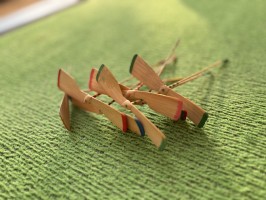










Dear Parents and Guardians,
We would like to share with you a heartwarming donation recently received by Suwa Kindergarten.
We were honored to receive a gift of handcrafted bamboo dragonflies (taketombo) from a former elementary school principal in Toshima Ward, Tokyo, who also served as Principal of the Japanese Weekend School of New Jersey (New York Area).
https://jwsnj.org/about-school
Although now retired, the donor has long cherished traditional Japanese bamboo craftsmanship. Each bamboo dragonfly has been carefully handmade, one by one, reflecting both dedication and skill.
Having devoted many years to Japanese education across national borders, and with a deep respect for Japanese craftsmanship, this donation represents a truly meaningful gift imbued with the spirit of tradition and craftsmanship.
For Suwa Kindergarten, which values tradition while also being blessed with international connections, this generous gesture is a great joy and a reminder of the importance of cultural ties.
We will continue to cherish opportunities that nurture the hearts and curiosity of our children.
Sincerely,
Suwa Kindergarten

理事長ブログ
このたび、諏訪幼稚園に心温まるご寄贈をいただきましたので、ご報告申し上げます。
東京都豊島区にて小学校校長を務められ、あわせてニュージャージー日本語補習授業校(公式ウェブサイト:https://jwsnj.org/ )においても校長としてご活躍された 平川 謙二郎 様 より、手作りの「竹とんぼ」を寄贈いただきました。
ニューヨーク・ニュージャージー地域の補習授業校は、海外に暮らす子どもたちが日本語や日本文化を学び続ける大切な教育の場です。平川様は、国境を越えて日本の教育に携わってこられた方であり、今回寄贈いただいた竹とんぼには、日本の伝統文化とものづくりの心、そして教育への深い思いが込められています。
伝統を大切にしながら、国際的なご縁にも恵まれてきた諏訪幼稚園にとって、このようなつながりをいただけたことを、大変うれしく思っております。
なお、本日、年長・年中組の子どもたちは園庭にて竹とんぼの練習を行いました。
今後も、子どもたちが日本の文化や遊びに親しみながら、心豊かに成長できる機会を大切にしてまいります。
— Kunishiro Taika Kogyo × Suwa Kindergarten —
A simple chance encounter in Tokyo’s Azabu-Juban quietly sparked a story no one expected.
From that moment, this project began.
One early summer day, we visited the showroom of Kunishiro Taika Kogyo.
While speaking with their representative, I happened to ask:
“We are gradually improving the garden at our kindergarten.
We’re hoping to create brick pathways and small towers for the children.
Would you happen to have suitable materials?”
Often, a story begins with just one small question.
And this single question opened the door to a future yet to be written.
After a brief pause, the representative smiled gently and replied:
“If you like, why not try using these bricks?
They were produced in our Tajimi factory here in Gifu and were used for a high-rise building in Osaka.
Some remain unused, and it would be a shame to discard them.”
It was a proposal we had never imagined.
Bricks born in Gifu, supporting the cityscape of Osaka,
and now returning to Gifu to take on a new life at a kindergarten.
Their journey itself felt like a story of “renewal.”
Under the warm early-summer sun, we visited the factory in Tajimi.
Craftsmen worked silently in front of the furnace as clay was transformed into brick through intense heat—
a living expression of craftsmanship at its very origin.
Feeling the warmth embedded in each brick, I thought:
“These bricks may one day support the future paths of our children.”
Kunishiro Taika Kogyo
Brand Story – Craftsmanship Nurtured in Mino
https://www.agorabrix.co.jp/brandstory
Then came autumn—the day of delivery.
The factory manager from Kunishiro Taika Kogyo greeted us with a gentle smile:
“We are delighted that the children are happy.
It feels as if our bricks are happy, too.”
These high-quality bricks are the same type used in public facilities across Gifu Prefecture.Their deep navy, reddish-brown, black, and gray tones blend sophistication with a natural harmony,
surprisingly well-suited to the surrounding landscape of Gifu.
In the kindergarten garden now surrounded by these bricks,
our Food & Agriculture Project is underway using organic farming methods.
With guidance from Veggie Hills, an organic farm in Hokkaido,
the children have grown crops such as watermelon and tomatoes,
and they are now planting the strawberry variety “Strawberry Sweet.”
“Many living things dwell in the soil.”
“Good vegetables can only grow from good soil.”
—such messages arrive from the northern fields of Hokkaido through online sessions.
The children are not only growing vegetables;
they are learning the meaning behind growing them.
Veggie Hills
https://www.veggiehills.com
Waiting for seeds to sprout, worrying on rainy days, rejoicing when fruit appears—each moment becomes a lesson in the “cycle of life.”
Craftsmen in Tajimi, organic farmers in Hokkaido,and the children of Suwa Kindergarten—hands far apart yet connected in a shared story of renewal and growth.
From Tokyo to Osaka, from Gifu to the north of Japan,this project weaves together distant places and people.
Bricks that once supported a city skyscraper now support the future of children.
The soil and the bricks teach us:
both life and materials can be reborn—again and again.
We extend our heartfelt appreciation to everyone who made this small story possible.
Tokyo, Osaka, Hokkaido, Tajimi, and Gifu—
places far apart, yet connected through helping hands and a shared hope for “renewal.”
Our sincere thanks go to Kunishoro Taika Kogyo for graciously providing the bricks,and to Veggie Hills,for continuously teaching our children about the “cycle of life” through food and agriculture.
And at the very beginning was a quiet moment near Patio Square in Azabu-Juban—a small stage of “serendipity,”where an unexpected yet fortunate encounter occurred.
Gifu and Tajimi are in the same prefecture,
yet without this Tokyo crossroads, these paths may never have met.
That serendipity has now brought people and materials together once again,
giving birth to a small but meaningful story of renewal.
We hope this story continues to gently breathe life into the future of our children.
— End —